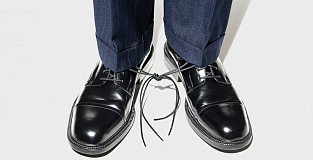
читайте также
What is an autumn?
Once upon a time Pavel Timofeev was very fond of early autumn. Every day at 6:30 sharp he went to the huge terrace of his country house with an enormous cup of tea, plopped in the rocking chair and spent fifteen minutes in blissful state of idleness. Unfortunately it was ‘once upon a time’. The autumn of 2011 evoked in him totally different feelings.
One September day he overslept for the first time. He stumbled over the terrace threshold, nearly dropping the cup, came to the rocking chair, took a sit and stared at the hazy distance. ‘It’s warm...there has been a rain. It’s time for mushrooms and for digging potatoes…in seven days, probably’ – thought the successful proprietor and the CEO of the furniture company ‘Prior’, which was regarded as a top-ranked leader in the Russian market of kitchen furniture.
Timofeev was not an inveterate mushroom gatherer; moreover he had never grown pollution-free vegetables by himself. But at the age of 38 he was surprised to learn that ‘seeding time’ can easily destroy all the mechanisms of assembly-line production.
On the 38th birthday in November 2010, Timofeev made a royal gift for himself: after long hesitations and meditations he bought Malahovskiy Woodworking Factory (MWF) in the Tver’s region – as an addition to the working factory in Mytishi. The goal was simple as all that genius, - to stop placing orders for other factories (the factory in Mytishi couldn’t cope with the current orders), to establish its own furniture production for the low price segment, but to continue producing plywood and chipboards as it was earlier.
In perspective, if it was possible to take the long-term lease for a large area of the forest fund and to build a sawmill, it would give the opportunity to provide the enterprise with its own raw materials.
‘You are looking to become a magnate on the interregional scale, Pavlik’- his friends joked. ‘If Pal Stepanich decided, he’ll make it!’ – talked the employees in the smoking-rooms of the central office (those who were supposed to be sent to a new project already started to weigh up how to spend their future bonuses for this shock work). ‘We wonder what he will do next. Is he crazy? Didn’t he forget how many nerves and how much money this work requires in the regions?!’ – whispered his competitors. According to them the new Timofeev’s project was the most risky investment in this sector. Timofeev was spoiled with victories and acceptance that is why the public was waiting with interest for the outcome of the Muscovite’s regional campaign. So did Pavel.
Exploration of the area.
The fact that MWF was almost on the verge of profitability Timofeev knew very well before signing the documents. He had never been guided by the principle ‘when we get stuck, we’ll sort everything out’, that’s why he spent lots of time with his top managers at the enterprise.
If Pavel had a poetic talent, he would title the story about his first visit as follows: ‘Delirium tremens in the black shops’. But he didn’t have it and during the traditional monthly meeting ‘with a refreshing glass of whisky’ he angrily told to his friends:
- In the shops you can shoot horror movies – you don’t even need decorations. I thought these ‘interiors’ remained in the Soviet past. I was wrong! There is neither ventilation nor central heating. The eatery has been destroyed as a class. There is a terrible mess all over the territory. The windows are covered with dust that it’s possible to study anthropogenic deposits (in the first diploma he had the speciality – ‘soil science’). The roads are run-down…So, why are you surprised that people don’t work in such conditions?
- By the way, about people, Pavlik, - his best friend Dima Poroshin interrupted the blistering tirade.
Now he worked as a ‘development director of human resources’ in a large brewing company and two years ago he was a personnel officer in one of its plants in the Novgorod region. – You’ll refit all the buildings, arrange green spaces in the territory and build an eatery. Your energy will be enough to make a recreation room for the plodders. You’ll hire a tolerable HR-director, he’ll tell you a lot of things: the material component of the salary package, the system of intangible incentives, the team building budget, the staff development plan. That is really nice, but what would you do with the brains? They are not these disciplined white-collars who will sell the soul to the devil in order to get a good salary package. They know nothing about motivations and compensations. Don’t forget: the Tver’s region is not the same with the Moscow Region. It isn’t even Tumen’, Magnitogorsk, where people have already understood what it means to work and to earn at oligarchic factories. I can even have a short argument that your future personnel don’t use the word ‘salary’. They get a pay. They are accustomed to get their two thousand rubles and they are not ready to earn five thousand. You understand better the entire nicety: activities, deliveries, equipment, ‘the optimal saw cut of plywood’, but I’ve warned you about future difficulties with the staff…
- Dima, I won’t ask you the familiar question ‘Do you respect me?’ I know you do. Don’t you think I understand nothing? I spent two weeks there. I know very well that people ruin themselves for drinking, that those who are intelligent have left this place in order to find a good job somewhere else, and the youth don’t want to work for two thousand rubles – they earn this money in stalls. I don’t know exactly what I have to do. I am recommended to try a shift work arrangement – to bring people from Moscow. It’s not suitable. Firstly, it’s necessary to find rotation workers; secondly we have to make new positions for locals. This MWF is still a town-forming enterprise…My plan is to kick the present director out and to promote his deputy Ershov – he’s made a good impression on me, he is a nice young man, he knows much about the local realias. Also I’ll bring my engineers, two managers and accountants and I want to improve the system of payments – maybe the youth will join us. All the lazybones should be fired, and those who want to work but don’t know how we should teach. As far as it is the HR-director concerned, I’ll outbid you, Dimka! And, in general, if I treat people well, they’ll understand me. This principle always works. - Timofeev was sure that there was nothing impossible in this world.
- We’ll see, we’ll see… - there was a doubt on Poroshin’s face. Other Pavel’s friends don’t share his enthusiasm, too.
To work in a new way
The new furniture shop was built in a breaking-record period – in two month. At the same time the ‘firewood’ reconstruction (the Prior’s workers gave this nickname for plywood and chipboard’s shops) was finished. January 27Th 2011 Pavel cut down the red ribbon with a formal ceremony, walked along the enterprise, surveying his new possession with pride. Timofeev was neither romantic no dreamer. He created ‘Prior’ from scratch and this factory had survived during the crisis. Nevertheless his imagination gave him a rosy picture: the staff worked with zeal in the clear shops, the new CEO Ershov ran the factory successfully, the new cheap collection ‘Comfort’ (Timoveef made up this name long ago, but didn’t know where to use it) received an award ‘The Best Product of the Year’, the governor of the Tver’s region awarded him ‘For outstanding regional service’. Frankly speaking, he was already trying the laurels…and thought about the possibility to buy one more woodworking enterprise in the backwoods and maybe to open new business directions. Why couldn’t he organize the production of cheap office furniture and sliding door wardrobes or even open his own design office?
But it was nothing of the sort. The first alarming news began to come from Ershov from the beginning of February (in a moment he joined Pavel’ belief that ‘everything will be fine otherwise it cannot be’ and relaxed a little bit). The workers refused to master the new high-tech equipment – somebody was lazy, somebody couldn’t cope with it. Timofeev hastily decided to send seventy most promising employees to Mytishinskiy enterprise in order to teach them working, and sighed with relief.
- Unfortunately I had no thoughts about it before, while the construction project was in process, - he said to Ershov by phone. I consider everything will be all right now. They will be taught. There we have a discipline like in the army - step right, step left means an execution or a fine. When they return they will set an example for others. While they are in the Moscow region, I’ll give you several workers from that factory – they will work and teach the staff. In general it’s a ‘two-in-one’ strategy.
- We’ll hope, Pasha! But it’s not the single problem. What should we do with the theft? The staff will barge to the country. They have to repair their ‘starling-houses’ that is why they will steal the plywood…- Ershov’s enthusiam was rapidly dwindling.
- You should adjust the system of stock accounting and the checkout system! – Timofeev said brusquely, clasping the telephone receiver to his shoulder and trying to park his car near the central office in Moscow.
- Ok, it’s clear. What should I do with hard drinking? I’ve fired the entire dipsomaniac, but today at about ten employees are in bad condition… they have a hangover… - Vasya, listen to me, I have the second line. Sort something out by yourself. What am I paying for? - Pavel was off the handle for a moment.
A week after the conversation twenty employees who had been sent to the course of advanced studies wrote a leave pass. It turned out that it wasn’t so easy to make the personnel work and study. They weren’t accustomed to it. Timofeev went to the Tver’ region for one week. He spoke with the workers; discuss the current situation with the Muscovites and the staff from Mytishi, whom he had sent here as ‘a locomotive of future changes’. According to the results he made several very important decisions. Firstly, to fire the workers, who regularly missed the work; in order to check the implementation of this order a strict pass entry system should be introduced. Secondly, to set the breath alcohol detection instrument at the medical station. (They will breath into the pipe. Someone, who breathed ‘badly’, will pay a fine. – Erchov, who offered this measure, rubbed his hands with pleasure.) Thirdly, to impose a new scheme of salary payment that takes into account the contributions of every employee. The most diligent should be given a bonus; all the idlers should be fired. Fourthly to send the MWF’s representatives to the regional trade schools in order to select the best graduating students and to offer them a good position. Those who will meet the requirements of ‘Prior’ and agree to the removal should be provided with housing in dormitory. The building of the hostel should be started immediately. Pavel calculated this large sum which he would invest in these projects…but he didn’t want to refuse his plans, he continued to believe that ‘everything will be all right’ – his enterprise in Mytishi functioned excellently.
The taken measures brought several results. By the mid of April the overall production was still lower that the planned one by financiers but it still rose by 40% in the furniture shop and by 45% in the plywood shop. Those who flatly refused to accept new rules were fired, others were forced ‘to make their brains think not only about the alcohol’ as one of Moscow’s engineers, who had been sent on a business trip, said.
The reinforcement was expected in July – the team of regional trade school graduates was going to come. The finishing of the hostel was planned by this time. The salary of the well-qualified workers increased to seven thousand rubles. At the general meeting Ershov promised more, but there was no reason to award the staff. Timofeev took heart and told Dima Poroshin about these small achievements with great pride, and promised: ‘Wait for more!’ Dima was happy for his friend but told that it was too early to make such conclusions.
The troubles began in May. One third of the trustworthy workers skipped the entire month. Neither fines nor persuasion could save the situation. The orders were disrupted, the shops stood idle. Meanwhile the working group of MWF planted potatoes and, holding the old habit, celebrated the May holidays – people still didn’t understand the New Year ones.
Timofeev planned the May recession but he didn’t expect such results. From the first call he interrupted his vacation, bought a ticket for the first flight from Barcelona to Moscow. Immediately, just after the landing, he went to the Tver’ region. There were maiden speeches, Timofeev was in a rage. From the threats of possible dismissal Timofeev and Ershov went over to the promise…to provide all the workers with potatoes.
In June the situation in these sphere became calmer, the gardeners came back and were ready to start working. Those who didn’t have any other violations was severely fined, others were fired. Their positions were taken by the graduates of the trade school, who certainly needed to learn everything from scratch by the experts.
However in August the new drain of the labor power started – they went ‘for mushrooms and berries’, as Ershov’s said. None of the experienced May absentees wanted to be fined. They were carrying faked sick certificates, which had been received by the personal connections or by friendship in any distinct hospital…
To be continued…?
The absurdity of this situation unsettled the proprietor of ‘Prior’. His mood wasn’t even improved by a beautiful September morning and hazy distances. He didn’t need the laurels of ‘the regional fate guardian’. If only the factory was running fine and simply gave the desirable amount of production. He thought about Vasiliy Ershov’s dismissal and at the same time he didn’t want to do it. ‘He doesn’t steal something at least; he speaks the same language with the workers and even offers some ideas. By the way, his idea to open a new MWF’s hospital, to provide the staff with the health insurance and to take only ‘these’ sick certificates is quite reasonable…’- thought Pavel, sipping his coffee.
He dreamt to turn off the mobile phone in order to miss the next call of Ershov. He was waiting for this call. He was afraid of it. ‘If despite all the measures taken the working group will miss the work because of collecting their harvest…I just don’t know what to do! Stick and carrot policy, kind words and bonuses – I’ve tried everything available. But people don’t want to work. Perhaps we should reject the bonus plan and to create a scheme of the minimum production? What if they are not sure that ‘Prior’ has serious intentions for the future... or I just couldn’t persuade them and a cellar full of potatoes seems to be a bird in the hand – probably it’s better for them to get good salaries? Perhaps it’s time to connect with external consultants and to admit my impotence…Dimka was right: ‘you can’t get the backwoods with your mind’. – Thinking about it Timofeev threw his briefcase in a brand new ‘range rover’ and went to his work.
What should Pavel Timofeev do?








